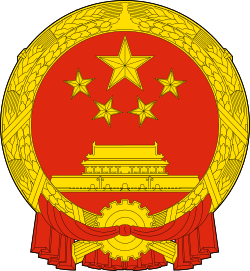Ma Kai
| Ma Kai | |
|---|---|
| 马凯 | |
 | |
| Vice Premier of the People's Republic of China | |
|
Assumed office 16 March 2013 Serving with Zhang Gaoli, Liu Yandong, Wang Yang | |
| Premier | Li Keqiang |
| Preceded by | Wang Qishan |
| State Councilor of the People's Republic of China | |
|
In office March 2008 – March 2013 | |
| Premier | Wen Jiabao |
| 10th Chairman of the National Development and Reform Commission | |
|
In office March 2003 – March 2008 | |
| Premier | Wen Jiabao |
| Preceded by | Zeng Peiyan |
| Succeeded by | Zhang Ping |
| Personal details | |
| Born |
June 1946 (age 70) Jinshan, Shanghai |
| Nationality | Chinese |
| Political party | Communist Party of China |
| Alma mater | Renmin University of China |
| Ma Kai | |||||||
| Simplified Chinese | 马凯 | ||||||
|---|---|---|---|---|---|---|---|
| Traditional Chinese | 馬凱 | ||||||
| |||||||

Ma Kai (Chinese: 马凯; pinyin: Mǎ Kǎi; born June 1946) is one of the four Vice Premiers of China (Fourth-ranked).[1] He was formerly a State Councilor and Secretary General of the State Council of China.
Biography
Ma Kai was born in Jinshan, Shanghai in 1946. He received his Master's degree from Renmin University of China in 1982.
His portfolio also includes putting forth Chinese policies with regard to global warming. He was a member of the 16th and the 17th Central Committee of the Communist Party of China, and is currently a member of the 18th. He was elected to 18th Politburo of the Communist Party of China in 2012.
In 2003 he was given responsibility for the National Development and Reform Commission, an organisation which has broad administrative and planning control over the Economy of China.[2]
References
- ↑ "Who's Who in China's New Government Leadership Lineup". Bloomberg. 16 March 2013. Retrieved 16 March 2013.
- ↑ Ma Kai, ChinaVitae, published 2003, accessed 2007-06-14
External links
| Wikimedia Commons has media related to Ma Kai. |
| Government offices | ||
|---|---|---|
| Preceded by Zeng Peiyan |
Chairman of National Development and Reform Commission 2003 –2008 |
Succeeded by Zhang Ping |
